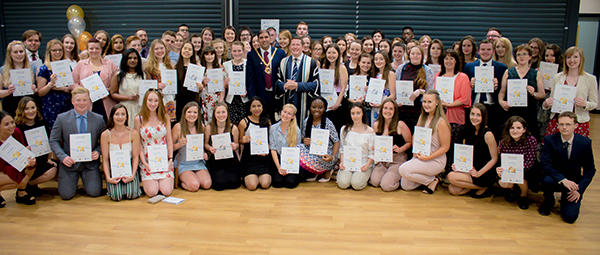Graduates from the University of Worcester are being snapped up into the work place with record high employment rates, new figures reveal.

The Higher Education Statistics Agency has released its latest employment figures, which show that 97% of Worcester graduates are in full-time employment or further study within six months of graduation. Traditionally, it takes some time for graduates to enter highly skilled employment but this year the proportion of graduates taking up highly skilled "graduate-level" jobs within the first six months is over 75% - an increase of 5.8% in a single year. Yet again, Worcester's employment rate is higher than the national university average.
University Vice Chancellor and Chief Executive, Professor David Green, said: "We are delighted that Worcester graduates are flourishing so soon and so successfully. Our current students make so much of their opportunities at Worcester. They are using the University opportunity as a powerful springboard to successful careers and purposeful, happy lives from graduation and beyond."
"The University of Worcester has gone out of our way to create additional opportunities for our students to gain skills and experiences which really boost their post University job prospects. Employability is built into all courses, with students undertaking work placements and/or participating in specialist employability related workshops and modules. The University also runs an extensive Earn as You Learn programme, and actively seeks to prepare graduates for the workplace including organising many opportunities to gain useful as additional qualifications in such areas as sports coaching, tutoring and specialist teaching."
This latest accolade comes after the University Worcester was ranked in the top 10 in the Country for sustained employment, with or without further study, one, three and five years after graduation, according to the Government-published Longitudinal Educational Outcomes (2017).
These latest figures build on a long period of success for Worcester graduates; even during the recession and long economic stagnation, employment rates at the University never fell below 92%. They also show that more than 67% of Worcester graduates remain in the West Midlands, providing a vital workforce for the local economy.
Professor Green added: "Our graduates use their education to not only benefit themselves but also society more broadly. We challenge them to think about how their education, research and lives will benefit humanity. Over 65 per cent of Worcester graduates enter the health and education sectors; this includes nurses, midwives, paramedics, school and early years teachers and those working in family support and social care particularly with children."
Worcester's work in inclusion has won a global reputation and led to it being shortlisted for the Times Higher Education University of the Year 2016 and being ranked in the top 10 of universities which best reflect society, according to recent analysis from HEPI the country's only specialist independent higher education think tank.